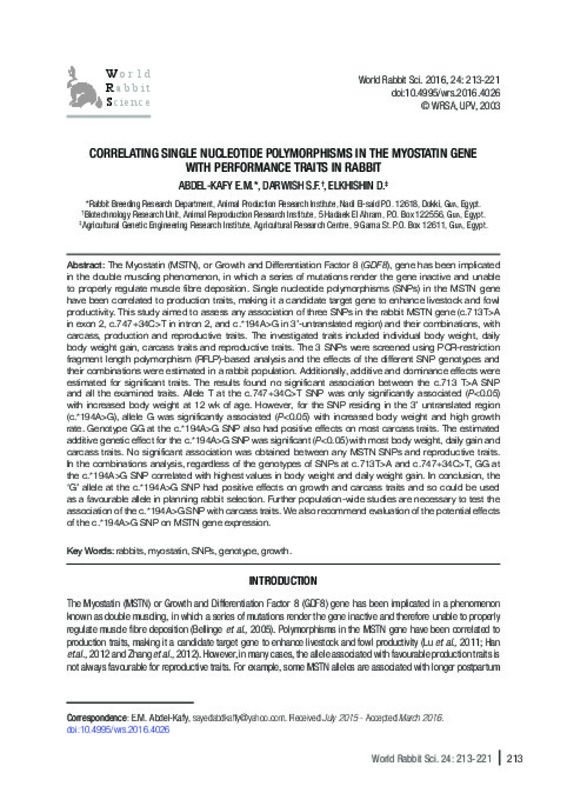|
Resumen:
|
[EN] The Myostatin (MSTN), or Growth and Differentiation Factor 8 (GDF8), gene has been implicated in the double muscling phenomenon, in which a series of mutations render the gene inactive and unable to properly regulate ...[+]
[EN] The Myostatin (MSTN), or Growth and Differentiation Factor 8 (GDF8), gene has been implicated in the double muscling phenomenon, in which a series of mutations render the gene inactive and unable to properly regulate muscle fibre deposition. Single nucleotide polymorphisms (SNPs) in the MSTN gene have been correlated to production traits, making it a candidate target gene to enhance livestock and fowl productivity. This study aimed to assess any association of three SNPs in the rabbit MSTN gene (c.713T>A in exon 2, c.747+34C>T in intron 2, and c.*194A>G in 3’-untranslated region) and their combinations, with carcass, production and reproductive traits. The investigated traits included individual body weight, daily body weight gain, carcass traits and reproductive traits. The 3 SNPs were screened using PCR-restriction fragment length polymorphism (RFLP)-based analysis and the effects of the different SNP genotypes and their combinations were estimated in a rabbit population. Additionally, additive and dominance effects were estimated for significant traits. The results found no significant association between the c.713 T>A SNP and all the examined traits. Allele T at the c.747+34C>T SNP was only significantly associated (P<0.05) with increased body weight at 12 wk of age. However, for the SNP residing in the 3’ untranslated region (c.*194A>G), allele G was significantly associated (P<0.05) with increased body weight and high growth rate. Genotype GG at the c.*194A>G SNP also had positive effects on most carcass traits. The estimated additive genetic effect for the c.*194A>G SNP was significant (P<0.05) with most body weight, daily gain and carcass traits. No significant association was obtained between any MSTN SNPs and reproductive traits. In the combinations analysis, regardless of the genotypes of SNPs at c.713T>A and c.747+34C>T, GG at the c.*194A>G SNP correlated with highest values in body weight and daily weight gain. In conclusion, the ‘G’ allele at the c.*194A>G SNP had positive effects on growth and carcass traits and so could be used as a favourable allele in planning rabbit selection. Further population-wide studies are necessary to test the association of the c.*194A>G SNP with carcass traits. We also recommend evaluation of the potential effects of the c.*194A>G SNP on MSTN gene expression.
[-]
|








